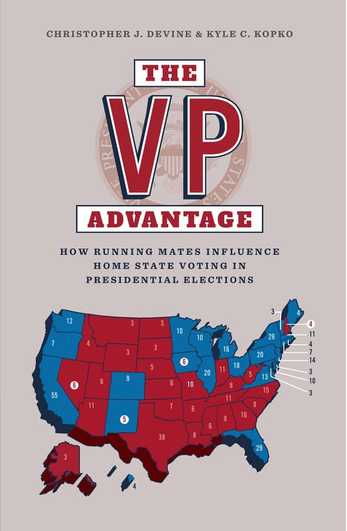|
“The VP Advantage” is available for purchase from Manchester University Press.
Read the book review from the London School of Economics and Political Science. You can buy the book on Amazon.com in hardcover and paperback. Read about news coverage of The VP Advantage in outlets like Politico Magazine, The Wall Street Journal, and Time Magazine. |
About "The VP Advantage"
A widespread perception exists among political commentators, campaign operatives, and presidential candidates that vice presidential running mates can “deliver” their home state’s electoral votes in a presidential election. For example, approximately half of all media profiles of “veepstakes” contenders in recent elections reference home state competitiveness as a key strength or weakness influencing the selection process. Most importantly, the perception of a vice presidential home state advantage has a discernible effect on presidential campaign strategy. In 2012, both the Obama and Romney campaigns devoted a disproportionate amount of advertising dollars and campaign visits to Wisconsin, as compared with other battleground states, following Paul Ryan’s selection as Republican vice presidential nominee. In 2008, Barack Obama’s campaign largely withdrew from Alaska upon Sarah Palin’s selection as John McCain’s running mate. And in 2004, both the Bush campaign and Kerry campaign began to contest North Carolina only after Kerry’s selection of John Edwards as the Democratic vice presidential candidate.
But is the perception of a vice presidential home state advantage real? And could it decide a presidential election? The VP Advantage is the most comprehensive analysis to date, and the first book-length manuscript, to scientifically analyze whether and under what circumstances vice presidential candidates influence vote choice and other key aspects of political behavior among home state voters in presidential elections. Utilizing a sophisticated multi-method approach, Devine and Kopko find that the vice presidential home state advantage is limited to candidates who come from relatively less-populous home states and have extensive experience as an elected official within that state. Moreover, this advantage – when it occurs – is extremely unlikely to prove decisive in the Electoral College. Indeed, Devine and Kopko present evidence to challenge the most prominent example of a purportedly decisive home state advantage in recent electoral history – John Kennedy’s selection of Texas Senator Lyndon Johnson in 1960. The conventional wisdom among historians, political scientists, and political commentators is that LBJ delivered his home state and region in that year’s election, effectively handing the presidency to Kennedy. However, using American National Election Studies data and internal polling from the Kennedy-Johnson campaign, Devine and Kopko find no evidence to support the hypothesis that Johnson provided an electoral advantage for the Democratic ticket in Texas or the South that year; in fact, the evidence suggests that Johnson was not especially popular within his home state and region by the time of the election. However, this is not to say that vice presidential candidates are irrelevant in presidential elections. There is evidence that a vice presidential candidate could, under narrow but plausible circumstances, deliver a decisive home state advantage for his or her ticket. Specifically, Devine and Kopko’s empirical analysis suggests that Al Gore could have secured a majority of Electoral College votes if he had selected vice presidential finalist Jeanne Shaheen, of New Hampshire, rather than Connecticut’s Joe Lieberman in 2000. Finally, the authors examine the influence of presidential versus vice presidential feeling thermometer ratings to gauge the relative importance of running mates in presidential elections, finding that they influence presidential voting but much less so than their partners at the top of the ticket.
But is the perception of a vice presidential home state advantage real? And could it decide a presidential election? The VP Advantage is the most comprehensive analysis to date, and the first book-length manuscript, to scientifically analyze whether and under what circumstances vice presidential candidates influence vote choice and other key aspects of political behavior among home state voters in presidential elections. Utilizing a sophisticated multi-method approach, Devine and Kopko find that the vice presidential home state advantage is limited to candidates who come from relatively less-populous home states and have extensive experience as an elected official within that state. Moreover, this advantage – when it occurs – is extremely unlikely to prove decisive in the Electoral College. Indeed, Devine and Kopko present evidence to challenge the most prominent example of a purportedly decisive home state advantage in recent electoral history – John Kennedy’s selection of Texas Senator Lyndon Johnson in 1960. The conventional wisdom among historians, political scientists, and political commentators is that LBJ delivered his home state and region in that year’s election, effectively handing the presidency to Kennedy. However, using American National Election Studies data and internal polling from the Kennedy-Johnson campaign, Devine and Kopko find no evidence to support the hypothesis that Johnson provided an electoral advantage for the Democratic ticket in Texas or the South that year; in fact, the evidence suggests that Johnson was not especially popular within his home state and region by the time of the election. However, this is not to say that vice presidential candidates are irrelevant in presidential elections. There is evidence that a vice presidential candidate could, under narrow but plausible circumstances, deliver a decisive home state advantage for his or her ticket. Specifically, Devine and Kopko’s empirical analysis suggests that Al Gore could have secured a majority of Electoral College votes if he had selected vice presidential finalist Jeanne Shaheen, of New Hampshire, rather than Connecticut’s Joe Lieberman in 2000. Finally, the authors examine the influence of presidential versus vice presidential feeling thermometer ratings to gauge the relative importance of running mates in presidential elections, finding that they influence presidential voting but much less so than their partners at the top of the ticket.
